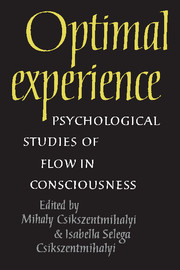Book contents
- Frontmatter
- Contents
- Acknowledgments
- Contributors
- I A THEORETICAL MODEL OF OPTIMAL EXPERIENCE
- II VARIETIES OF THE FLOW EXPERIENCE
- III FLOW AS A WAY OF LIFE
- IV THE MEASUREMENT OF FLOW IN EVERYDAY LIFE
- 15 Introduction to Part IV
- 16 The systematic assessment of flow in daily experience
- 17 The quality of experience in the flow channels: comparison of Italian and U.S. students
- 18 Flow and the quality of experience during work and leisure
- 19 Optimal experience and the uses of talent
- 20 Self-esteem and optimal experience
- 21 Optimal experience and the family context
- 22 The future of flow
- References
- Name index
- Subject index
20 - Self-esteem and optimal experience
Published online by Cambridge University Press: 05 June 2012
- Frontmatter
- Contents
- Acknowledgments
- Contributors
- I A THEORETICAL MODEL OF OPTIMAL EXPERIENCE
- II VARIETIES OF THE FLOW EXPERIENCE
- III FLOW AS A WAY OF LIFE
- IV THE MEASUREMENT OF FLOW IN EVERYDAY LIFE
- 15 Introduction to Part IV
- 16 The systematic assessment of flow in daily experience
- 17 The quality of experience in the flow channels: comparison of Italian and U.S. students
- 18 Flow and the quality of experience during work and leisure
- 19 Optimal experience and the uses of talent
- 20 Self-esteem and optimal experience
- 21 Optimal experience and the family context
- 22 The future of flow
- References
- Name index
- Subject index
Summary
One of the most intriguing aspects of flow theory concerns the effects of the experience on the sense of self. On the one hand, a person in flow is supposed to be unself-conscious. On the other hand, the self is said to emerge strengthened from the experience (Csikszentmihalyi & Graef 1980; Csikszentmihalyi 1982a, 1985b). Presumably, even though the self need not be in the focus of awareness during optimal experience – when rules and goals are clear – the positive feedback obtained from it stays on and contributes to a more sturdy self-concept after the flow episode is over and self-consciousness returns.
The first aspect of this apparently paradoxical relationship has been documented empirically by previous studies. It seems clear that when people report being self-conscious, their subjective states are less positive than when they are unself-conscious (Wicklund 1975; Csikszentmihalyi & Figurski 1982). Thus on a moment-to-moment basis, flow and a sense of self appear to be mutually exclusive. However, the second aspect, namely the relationship between flow and a person's overall sense of self-esteem, has not been approached empirically before. The present study addresses this question: Is there a positive association between flow and self-esteem?
Wells (1985, 1986) used the Experience Sampling Method (ESM) to study variations in the self-esteem of 49 mothers and found several factors that were significantly related to fluctuations in self-esteem as the women went about their daily lives (e.g., presence vs. absence of their children, aspects of the interpersonal situation).
- Type
- Chapter
- Information
- Optimal ExperiencePsychological Studies of Flow in Consciousness, pp. 327 - 341Publisher: Cambridge University PressPrint publication year: 1988
- 35
- Cited by



